八年级下英语复习资料
新人教版英语八年级下册unit2-单元总复习课件

3. 义务做, 自愿做 (v. )
志愿者(n.)
_v_o_l_u_n_te_e_r__
4. 信号;标志(n. ) __s_i_g_n_____
volunteer to do sth. 义务自愿做某事
5. 通知, 通告, 注意(n. )
注意到;意识到 (v.) __n_o_t_ic_e____ 6. 孤独的, 寂寞的(adj. ) ___l_o_n_e_l_y__
satisfaction owner
词汇训练营
快速回忆所学单词,看谁说得又快又准!
13.丧失能力的;有残疾的(adj.) _d_is_a_b_l_e_d___ 14.想象;设想(v. ) __im__a_g_i_n_e__d_is (否定前缀) +able (能够) disabled
15.影响, 有作用 _m_a_k__e_a_d__if_fe_r_e_n_c_e_
语法加油站
二. 作宾语补足语 例: The teacher asked us to read English for half an hour in the morning. The teacher often tells Jim not to spend too much time playing computer games. 动词不定式作宾语补足语,表示宾语所做的动作,可以用动词不定式作宾语 补足语的动词有: tell, ask, want, like, invite, encourage, help等。
A.that
B.this
C.it
D.one
3. Mo Yan's books have been sold out in many book stores _D___
沪教版八年级英语下册--各单元知识点及复习
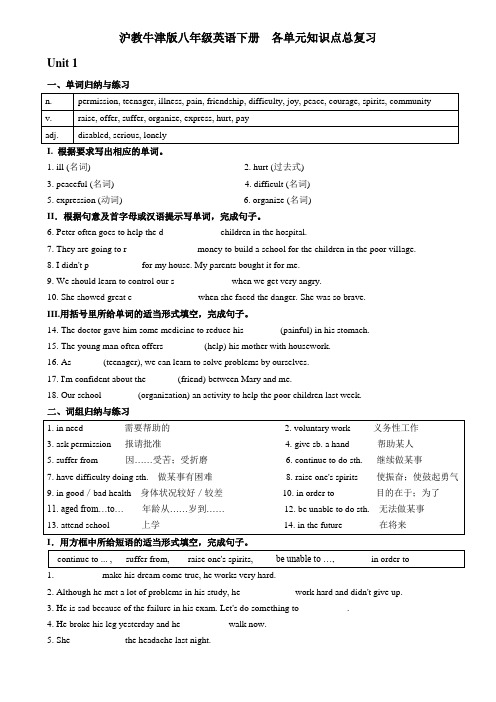
沪教牛津版八年级英语下册各单元知识点总复习Unit 1一、单词归纳与练习I. 根据要求写出相应的单词。
1. ill (名词) ____________________2. hurt (过去式) ____________________3. peaceful (名词) ____________________4. difficult (名词) ____________________5. expression (动词) ____________________6. organize (名词) ____________________ II.根据句意及首字母或汉语提示写单词,完成句子。
6. Peter often goes to help the d____________ children in the hospital.7. They are going to r_______________ money to build a school for the children in the poor village.8. I didn't p___________ for my house. My parents bought it for me.9. We should learn to control our s____________ when we get very angry.10. She showed great c______________ when she faced the danger. She was so brave.III.用括号里所给单词的适当形式填空,完成句子。
14. The doctor gave him some medicine to reduce his _______ (painful) in his stomach.15. The young man often offers ________ (help) his mother with housework.16. As ______ (teenager), we can learn to solve problems by ourselves.17. I'm confident about the ______ (friend) between Mary and me.18. Our school _______ (organization) an activity to help the poor children last week.二、词组归纳与练习I.用方框中所给短语的适当形式填空,完成句子。
人教八年级下册英语期末专项复习——词汇与句子(含答案)
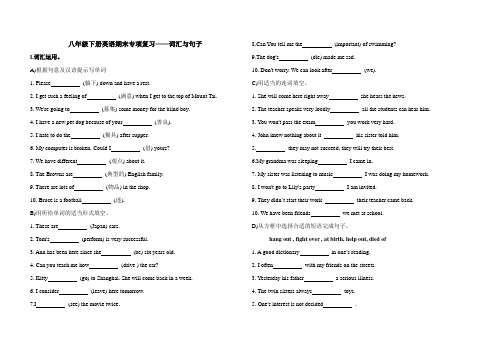
八年级下册英语期末专项复习——词汇与句子I.词汇运用。
A)根据句意及汉语提示写单词1. Please (躺下) down and have a rest.2. I get such a feeling of (满意) when I get to the top of Mount Tai.3. We're going to (募集) some money for the blind boy.4. I have a new pet dog because of your (善良).5. I hate to do the (餐具) after supper.6. My computer is broken. Could I (借) yours?7. We have different (观点) about it.8. The Browns are (典型的) English family.9. There are lots of (物品) in the shop.10. Bruce is a football (迷).B)用所给单词的适当形式填空。
1. These are (Japan) cars.2. Tom's (perform) is very successful.3. Ann has been here since she (be) six years old.4. Can you teach me how (drive ) the car?5. Kitty (go) to Shanghai. She will come back in a week.6. I consider (leave) here tomorrow.7.I (see) the movie twice. 8.Can You tell me the (important) of swimming?9.The dog's (die) made me sad.10. Don't worry. We can look after (we).C)用适当的连词填空。
中考英语复习 八年级(下) Units 1~2 人与社会—志愿服务与公共服务

D. How many kinds of volunteer jobs there are.
( B ) 2. What does the underlined word “motivated” mean in Paragraph 3?
A. creative B. active C. brave
D. smart
八年级(下) Units 1~2
By giving to others, you feel what is called “the helper's high”—a positive feeling. Volunteering can make you happier over time, too. 3题It has been shown to reduce feelings of worries, because many people find that they are moving away from their personal worries by paying much attention to the needs of others. “Volunteering also gives a chance to connect with people, which is good news for our spirit health,” says Jolie Goodman of the Mental Health Foundation. 5题Studies have shown that volunteering can improve your physical health, too.
1 阅读理解 2 任务型阅读 3 完形填空 4 语篇填空 5 补全对话
期末知识点复习课件2022-2023学年人教版英语八年级下册
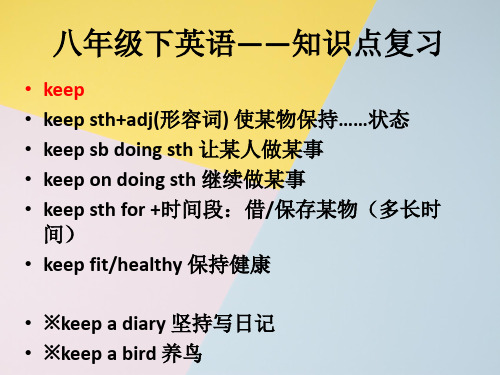
• 不定式 • learn to do sth 学会做某事 • encourage sb to do sth 鼓励某人做某事 • tell sb to do sth 告诉某人要做某事 • tell sb not to do sth 告诉某人不要做某事 • invite sb to do sth 邀请某人做某事 • invite sb not to do sth 邀请某人不做某事 • decide to do sth 决定做某事 • decide not to do sth 决定不做某事 • have to 必须don’t have to 不必 • try to do sth 尽力做某事 • try not to do sth 尽力不做某事
• so/such:如此…… • 用法如下: • such+名词短语 • so +形容词 • so many/much/few/little
• 一点儿 • a little 一点儿(修饰不可数名词和形容词) • a bit 一点儿(后接形容词) •
•
• put • put out 熄灭 • put on 穿上 • put off 下车 • put up 挂起、张贴 • put down 放下
八年级下英语——知识点复习
• keep • keep sth+adj(形容词) 使某物保持……状态 • keep sb doing sth 让某人做某事 • keep on doing sth 继续做某事 • keep sth for +时间段:借/保存某物(多长时
间) • keep fit/healthy 保持健康
• either…or…或者……或者……,连接两个主语时,谓 语动词在数的方面与or后面的主语保持一致。
中考英语复习人教版 八年级(下)重点词汇附答案
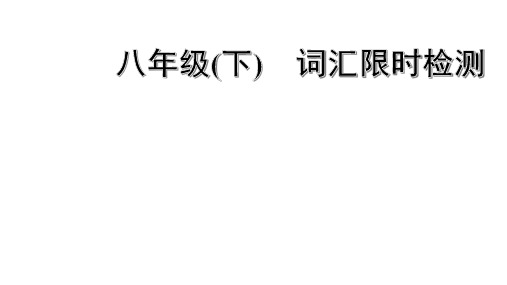
I always do housework at home. When I was in the 1.__t_h_ir_d___ (three) grade, I was asked to clean my bedroom. At first, I was very unhappy to do that, because I thought housework was a 2._n_a_t_u_r_a_l (nature) job of mom's. But one day, I saw my mom sleeping, looking tired. I 3.__r_e_a_li_z_ed__(realize) she had worked all day and still had to do much housework at home. After that, I made 4.___a___ decision to help with housework. I started to clean up my 5.__m_e_s_s_y_ bedroom
Passage 4 万唯原创 Last summer, I went to Qingdao with my parents.The sun 1.___sh__o_n_e__(shine) every day and the air was fresh, which made us so comfortable. We couldn't wait to go to the seaside foinrstthe 2.________ (one) day. I remcleeamrblyer 3.________(clear) when we were lying on the beach, we saw a little crab(螃蟹) walking towards us. I was so excited and played wiwthhiiltefor a 4.________. Because it was in summer, there wteorueriastlsot of 5.________(tourist) on the beach and in the seariends and talked to foreigners. I bought many 6.__in_t_e_r_e_s_ti_n_g__(interest) souvenirs for my friends. Besides, I picked some colorful shells. There we lived in an amazing hotel, and we were 7._p_r_o_v_i_d_e_d_(provide)with the firstclass service. I like Qingdao very much. The whole trip was so good that we relieved(释放) all the stress and enjoyed 8.__o_u__rs_e_l_v_e_s__(we). It is such 9.___a____ wonderful place. I have fallen 10. ___in_____ love with this coastal city and I hope to go there once more.
(必考题)初中英语八年级下册期末复习题(含答案解析)
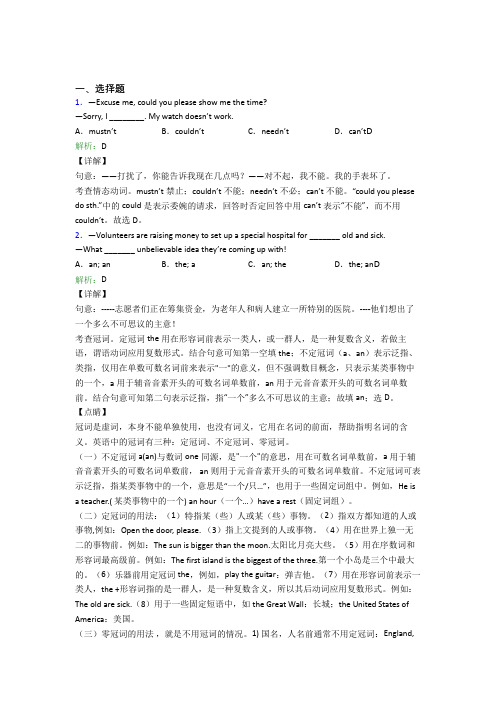
一、选择题1.—Excuse me, could you please show me the time?—Sorry, I ________. My watch doesn’t work.A.mustn’t B.couldn’t C.needn’t D.can’t D解析:D【详解】句意:——打扰了,你能告诉我现在几点吗?——对不起,我不能。
我的手表坏了。
考查情态动词。
mustn’t禁止;couldn’t不能;needn’t不必;can’t不能。
“could you please do sth.”中的could是表示委婉的请求,回答时否定回答中用can’t表示“不能”,而不用couldn’t。
故选D。
2.—Volunteers are raising money to set up a special hospital for _______ old and sick. —What _______ unbelievable idea they’re coming up with!A.an; an B.the; a C.an; the D.the; an D解析:D【详解】句意:-----志愿者们正在筹集资金,为老年人和病人建立一所特别的医院。
----他们想出了一个多么不可思议的主意!考查冠词。
定冠词the用在形容词前表示一类人,或一群人,是一种复数含义,若做主语,谓语动词应用复数形式。
结合句意可知第一空填the;不定冠词(a、an)表示泛指、类指,仅用在单数可数名词前来表示"一"的意义,但不强调数目概念,只表示某类事物中的一个,a用于辅音音素开头的可数名词单数前,an用于元音音素开头的可数名词单数前。
结合句意可知第二句表示泛指,指“一个”多么不可思议的主意;故填an;选D。
【点睛】冠词是虚词,本身不能单独使用,也没有词义,它用在名词的前面,帮助指明名词的含义。
英语中的冠词有三种:定冠词、不定冠词、零冠词。
初中英语 人教版八年级下册期末总复习(讲练+习题含答案,共104张PPT)

3. I think there will be more / less pollution. 我认为将会有更多/更少的污染。
fewer与less及more表数量的用法。
(3)many“许多”,修饰可数名词。 much“许多”,修饰不可数名词。
many / much比较级、最高级为不规则变化:many / much-more-most
“a few”表示“一些”+可数名词
例:a few days ago, for a few weeks, He has few friends here. There will be fewer trees.
3. I think there will be more / less pollution. 我认为将会有更多/更少的污染。
He went home after two days. 他两天后回家了。 Three years later,she had a baby. 三年后,她生了一个婴儿。
fall in love with 爱上… fall in love with a girl 爱上一个女孩 fall in love with a country 爱上一个国家
例:I have many magazines. She has more magazines. But he has the most. There will be more people on the earth in future. More and more students start to exercise more every day to keep fit.
典例展示 2.About Pollution
Tina: There is much pollution around us.
- 1、下载文档前请自行甄别文档内容的完整性,平台不提供额外的编辑、内容补充、找答案等附加服务。
- 2、"仅部分预览"的文档,不可在线预览部分如存在完整性等问题,可反馈申请退款(可完整预览的文档不适用该条件!)。
- 3、如文档侵犯您的权益,请联系客服反馈,我们会尽快为您处理(人工客服工作时间:9:00-18:30)。
八年级下复习资料◆unit 1 Will people have robots?目标语言:Make predictions重点句型:People won’t use money. Everything will be free.Books will only be on computers, not on paper.Kids won’t go to school. They’ll study at home on computer.There will only be one country.People will live to be 200 years old.Will people use money in 100 years? No, they won’t.There will be more people.There will be less free time.There will be fewer cars.There will be less pollution.There will be fewer trees.I agree.What do you think Sally will be in five years?I think she will be a doctor.Where do you live? I live in an apartment.知识点:1.形容词,副词的比较等级考查热点透视:a) 表示A与B在程度上相同时,“as+形容词或副词的原级+as”结构。
表示A 不如B时,可用“not as/so+形容词或副词的原级+as”结构。
b) 表示A比B在程度上“更…..”时,可用“形容词或副词的比较级+than”结构c) 表示三者或三者以上的比较,其中一个在程度上“最…..”时,常用“the+形容词或副词的最高级”结构,后面可带“of/in的短语”来说明比较的范围。
(注意:副词的最高级在句中常省略“the”.)d) 在形容词或副词的比较级前,可以用“a little, even, far, much,still”的等词语来修饰,以加强语气。
e) 表示“越来越….”时,常用“形容词或副词的比较级+and+形容词或副词的比较级”结构,但要注意,对于多音节和部分双音节形容词,副词而言,若要表达此意时,要用“more and more+形容词或副词的原级“结构。
f) 在表示“其中最….之一“的含义时,常使用“one of+the+形容词最高级形式+名词复数”结构,其中的定冠词the不可以省略。
g) 如果强调“两者中比较…的(一个)”的意思时,可使用“the+形容词比较级+其它”结构。
h) 表示“越….越….”, 可使用“the+形容词或副词的比较级,the+形容词或副词的比较级”结构。
2.几个相似的“It句型”a) It’s +adj.+ that从句:在该句型中,it代替that从句,形容词用来说明that从句内容的性质。
如,It’s polite that you always give seats to the elderly on the bus.b) It’s +adj.+to do sth.在该句型中,it代替to do sth的内容,形容词用来说明to do sth的性质。
如,It’s useful to remember lots of words before the exams.c) It’s +adj.+for sb. to do sth.在该句型中,it代替to do sth的内容,形容词用来强调to do sth就sb而言的性质(常见的形容词有possible, important, necessary, difficult)d) It’s +adj.+of sb. to do sth.在该句型中,it代替to do sth.的内容,形容词用来强调of后所接宾语本身的性质(常见的形容词有kind, rude, clever, foolish, polite).3.一般将来时a) 一般将来时的构成:由助动词shall或will加动词原形构成,shall用于第一人称。
在口语中,will在名词或代词后常简略为’ll,will not常简略为won’t。
这个时态的肯定,否定和疑问结构可表示如下:肯定句否定句疑问句I (We)shall(will) go.You(He, She, They) will go. I(We)shall(will) not go.You(He, She, They)will not go. Shall I(we) go?Will you (he, she, they) go?用”be going to +动词原形”也可表示将来时,表示将要发生的事,打算或决定要做的事。
I think it is going to snow.我看要下雪。
b)一般将来时的用法:1)表示将要发生的动作或情况;2)不以人的意志为转移,肯定要发生的事情。
The day after tomorrow will be National Day.后天是国庆日。
4. in/after:in是指以现在时间为起点的“在一段时间以后”。
也可以表示“在将来多少时间之内”,句子中的谓语动词要用一般将来时态;after常指以过去时间为起点的“一段时间之后”,所以它与过去时态连用。
当after指某个特定的未来时刻或日期之后,或指以将来某一时间为起点的若干时间之后时,它可以与将来时态连用。
5.more, less, fewer的用法区别:more为many, much的比较级,意为“更多”,可修饰可数与不可数名词。
Less是little的比较级,意为“更好,较少”,修饰不可数名词。
Fewer是few的比较级,意为“更少”,修饰可数名词复数。
【注意】few, little表示否定“几乎没有”。
a few, a little表示肯定“一点,几个”。
如,Because he often stays at home, he has few friends.6.there be与have的区别:1)含义不同。
there be表示的是“某地(时)有某人(物)”,强调“存在关系”。
Have则表示“某人(物)所有”,强调“所属关系”。
如,There is a bus in your factory.(公共汽车不一定属于我们厂所有)Our factory has a bus.(公共汽车属于我们厂所有)2)句型不同。
there be句型为“There be +某人(物)+某时(地)”;have 句型为“某人(物)+have(has)+某物(人)。
如There isn’t a cat under the chair. She doesn’t have two brothers.3)当表示某物的构成和组成部分时,用there be和have 均可。
如,Our school has sixty classes.= There are sixty classes in our school.我们学校有60个班。
【注意】there be句型中有两个或多个并列主语时,须根据就近原则,be与最靠近的主语在数上保持一致。
如,There are two eggs and a cup of milk on the table.There be句型的将来时表达方式:肯定:There will be…否定:Th ere won’t be…一般疑问句:Will there be….? Yes, there will. No, there won’t.7. be worth doing值得;be worthy of doing, be worthy to do值得8.Seem的用法:1)seem to do似乎…He seems to think so.2)It seems that看来…It seems that he is lying. 3) seem +adj./n.好象是… He seems ill.9.would like sth意思为“想要某物“;would like to do意思为”想要做某事“。
回答would like句型的一般疑问句时,其肯定回答为“Yes, please.”;否定回答“No, thanks”或“I’d like /love to, but….”10.make sb. do; make +n+adj.; make friends with sb.; make +n./ pron.+n.11. Such作形容词,意思是“如此的”“这样的”,修饰各种名词。
Such这样的。
如It is such bad weather.天气如此恶劣。
⌝Such常和as搭配,表示一种类别。
如We enjoy such a voice as hers.我们喜欢象她那样的嗓子。
⌝Such常和表示结果的that从句搭配,表示“如此….以至于…”如⌝It was such a hot day that we all had to stay at home.Such…that…和so…that…都可用来引出一个结果状语从句。
由于such是形容词,所以that从句前有一个受such修饰的名词;而so 是副词,用以修饰形容词或副词,因此that从句前一般不出现名词。
如⌝They are such kind-hearted teachers that people in the village all respect them.The exam was so difficult that many students failed to pass it.a) 如果名词是可数名词的单数形式,such和so的位置不同:such+a/an+形容词+单数名词so+形容词+a/an+单数名词b) 如果名词是不可数名词或名词复数,只可用such,不能用so.:such+形容词+不可数名词或复数名词c) 如果被修饰的不可数名词被much, little, 或复数名词被many, few等表示量的形容词修饰时,用so,不用such.d) 当little表示“年纪小的”时,可用such+little+名词There were such little children that they couldn’t clean the room.12. people, person, folks, human: people“人们“全体;person “人”(不分年龄,性别它包括men, women, children.它可做people的单数形式可以说every person但不能说one people. Person指“人们”时着重个体;folks“人们”,指一般人或特殊年龄位置,境遇等特殊级的人;human主要用来区别于其他动物。
